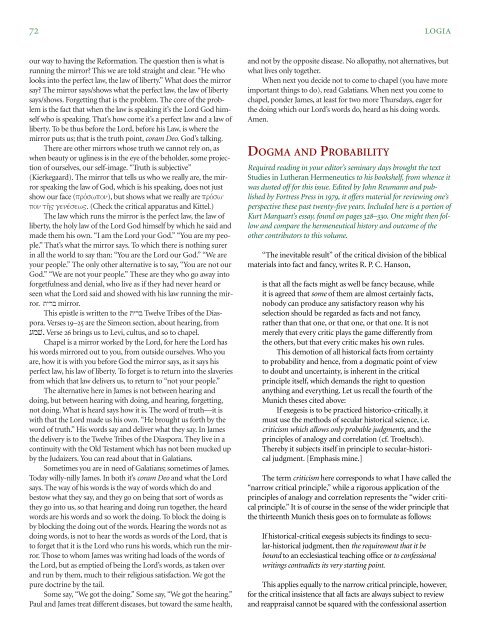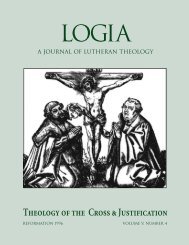04-2 Hermeneutics.pdf
04-2 Hermeneutics.pdf
04-2 Hermeneutics.pdf
- No tags were found...
Create successful ePaper yourself
Turn your PDF publications into a flip-book with our unique Google optimized e-Paper software.
72 LOGIAour way to having the Reformation. The question then is what isrunning the mirror? This we are told straight and clear. “He wholooks into the perfect law, the law of liberty.” What does the mirrorsay? The mirror says/shows what the perfect law, the law of libertysays/shows. Forgetting that is the problem. The core of the problemis the fact that when the law is speaking it’s the Lord God himselfwho is speaking. That’s how come it’s a perfect law and a law ofliberty. To be thus before the Lord, before his Law, is where themirror puts us; that is the truth point, coram Deo. God’s talking.There are other mirrors whose truth we cannot rely on, aswhen beauty or ugliness is in the eye of the beholder, some projectionof ourselves, our self-image. “Truth is subjective”(Kierkegaard). The mirror that tells us who we really are, the mirrorspeaking the law of God, which is his speaking, does not justshow our face (provswpon), but shows what we really are provswponth'" genevsew". (Check the critical apparatus and Kittel.)The law which runs the mirror is the perfect law, the law ofliberty, the holy law of the Lord God himself by which he said andmade them his own. “I am the Lord your God.” “You are my people.”That’s what the mirror says. To which there is nothing surerin all the world to say than: “You are the Lord our God.” “We areyour people.” The only other alternative is to say, “You are not ourGod.” “We are not your people.” These are they who go away intoforgetfulness and denial, who live as if they had never heard orseen what the Lord said and showed with his law running the mirror.tyrb mirror.This epistle is written to the tyrb Twelve Tribes of the Diaspora.Verses 19–25 are the Simeon section, about hearing, from[mv. Verse 26 brings us to Levi, cultus, and so to chapel.Chapel is a mirror worked by the Lord, for here the Lord hashis words mirrored out to you, from outside ourselves. Who youare, how it is with you before God the mirror says, as it says hisperfect law, his law of liberty. To forget is to return into the slaveriesfrom which that law delivers us, to return to “not your people.”The alternative here in James is not between hearing anddoing, but between hearing with doing, and hearing, forgetting,not doing. What is heard says how it is. The word of truth—it iswith that the Lord made us his own. “He brought us forth by theword of truth.” His words say and deliver what they say. In Jamesthe delivery is to the Twelve Tribes of the Diaspora. They live in acontinuity with the Old Testament which has not been mucked upby the Judaizers. You can read about that in Galatians.Sometimes you are in need of Galatians; sometimes of James.Today willy-nilly James. In both it’s coram Deo and what the Lordsays. The way of his words is the way of words which do andbestow what they say, and they go on being that sort of words asthey go into us, so that hearing and doing run together, the heardwords are his words and so work the doing. To block the doing isby blocking the doing out of the words. Hearing the words not asdoing words, is not to hear the words as words of the Lord, that isto forget that it is the Lord who runs his words, which run the mirror.Those to whom James was writing had loads of the words ofthe Lord, but as emptied of being the Lord’s words, as taken overand run by them, much to their religious satisfaction. We got thepure doctrine by the tail.Some say, “We got the doing.” Some say, “We got the hearing.”Paul and James treat different diseases, but toward the same health,and not by the opposite disease. No allopathy, not alternatives, butwhat lives only together.When next you decide not to come to chapel (you have moreimportant things to do), read Galatians. When next you come tochapel, ponder James, at least for two more Thursdays, eager forthe doing which our Lord’s words do, heard as his doing words.Amen.DOGMA AND PROBABILITYRequired reading in your editor’s seminary days brought the textStudies in Lutheran <strong>Hermeneutics</strong> to his bookshelf, from whence itwas dusted off for this issue. Edited by John Reumann and publishedby Fortress Press in 1979, it offers material for reviewing one’sperspective these past twenty-five years. Included here is a portion ofKurt Marquart’s essay, found on pages 328–330. One might then followand compare the hermeneutical history and outcome of theother contributors to this volume.“The inevitable result” of the critical division of the biblicalmaterials into fact and fancy, writes R. P. C. Hanson,is that all the facts might as well be fancy because, whileit is agreed that some of them are almost certainly facts,nobody can produce any satisfactory reason why hisselection should be regarded as facts and not fancy,rather than that one, or that one, or that one. It is notmerely that every critic plays the game differently fromthe others, but that every critic makes his own rules.This demotion of all historical facts from certaintyto probability and hence, from a dogmatic point of viewto doubt and uncertainty, is inherent in the criticalprinciple itself, which demands the right to questionanything and everything. Let us recall the fourth of theMunich theses cited above:If exegesis is to be practiced historico-critically, itmust use the methods of secular historical science, i.e.criticism which allows only probable judgments, and theprinciples of analogy and correlation (cf. Troeltsch).Thereby it subjects itself in principle to secular-historicaljudgment. [Emphasis mine.]The term criticism here corresponds to what I have called the“narrow critical principle,” while a rigorous application of theprinciples of analogy and correlation represents the “wider criticalprinciple.” It is of course in the sense of the wider principle thatthe thirteenth Munich thesis goes on to formulate as follows:If historical-critical exegesis subjects its findings to secular-historicaljudgment, then the requirement that it bebound to an ecclesiastical teaching office or to confessionalwritings contradicts its very starting point.This applies equally to the narrow critical principle, however,for the critical insistence that all facts are always subject to reviewand reappraisal cannot be squared with the confessional assertion
















